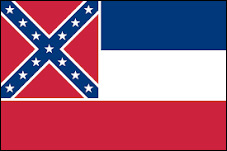By Jim Ellis
Nov. 7, 2019 — Kentucky’s GOP Gov. Bevin looses, Republican Reeves wins in Mississippi and state legislatures in New Jersey and Virginia are looking decidedly blue …
Kentucky
 Gov. Matt Bevin (R), always lagging near the bottom of the 50-state gubernatorial approval polls throughout his term, lost his re-election bid to Democratic Attorney General Andy Beshear.
Gov. Matt Bevin (R), always lagging near the bottom of the 50-state gubernatorial approval polls throughout his term, lost his re-election bid to Democratic Attorney General Andy Beshear.
The vote totals fell within three-tenths of one percent, or an unofficial raw vote margin of 5,150 votes of 1.41 million votes cast. The Beshear victory spread translates into just 1.4 votes per precinct, statewide. Additionally, the Libertarian candidate in the race, Kyle Hugenberg, attracted over 46,000 votes, nine times greater than the spread between the two major party candidates.
The defeat appears to belong solely to Gov. Bevin, and not the Republican Party in general. The down-ballot Republicans scored a clean sweep, converting the attorney general’s office that Beshear held with 58 percent of the vote, and the secretary of state’s position (52 percent). GOP incumbents also were re-elected as state treasurer (61 percent), agriculture commissioner (58 percent), and auditor general (56 percent). With these hefty Republican percentages recorded for the other offices, it is clear that Gov. Bevin severely under-performed.
Political trouble for the governor became apparent when he won re-nomination last May with just 52 percent of the vote against little-known state Rep. Robert Goforth (R-East Bernstadt) and two others. Bevin under-performed in the “coal country” area of the state, an area from which Goforth hails, and again fell below typical Republican vote patterns here in the general election, which evidently cost him the race. Mining healthcare issues became a problem for Bevin, and his position with regard to miner health benefits went a long way toward unseating him election night.
Andy Beshear was elected attorney general in 2015. His father, Steve Beshear (D), served the maximum two terms as governor prior to Bevin winning four years ago. Therefore, the Beshear name is extremely well known throughout Kentucky.
Voter turnout was up a whopping 45 percent above the 2015 odd-year election, though still significantly under presidential levels. In 2016, more than 1.9 million voters cast ballots in the presidential election.
Mississippi
The Mississippi voter patterns in the election were similar to Kentucky’s, except for the final result in the governor’s race.
In this contest, Republican Lt. Gov. Tate Reeves defeated four-term Attorney General Jim Hood (D), 52-46 percent, thus likely nullifying a federal court challenge to the state’s system of requiring that gubernatorial candidates carry a majority of state House of Representatives’ districts in addition to winning the popular statewide vote. Since Reeves recorded a clear majority in the popular vote, there will be no grounds for legal action.





 • Gov. Steve Bullock: As has been expected for some time, Montana Gov. Steve Bullock (D) officially announced his presidential effort this week, becoming the 23rd Democratic candidate. Bullock made the argument that he will be an effective national candidate because he’s won two elections in a conservative state and has been able to earn legislative achievements, like Medicaid expansion, in negotiating with Republican leaders.
• Gov. Steve Bullock: As has been expected for some time, Montana Gov. Steve Bullock (D) officially announced his presidential effort this week, becoming the 23rd Democratic candidate. Bullock made the argument that he will be an effective national candidate because he’s won two elections in a conservative state and has been able to earn legislative achievements, like Medicaid expansion, in negotiating with Republican leaders.